Skyrim punishes you by wasting your time.

Academic journals are often awful about accessibility. If you don’t have access to a university library, it’s almost impossible to know what’s going on in the academic community. Fortunately, “open-source” or free, online academic journals are gaining in popularity. Mediascape, UCLA’s journal of cinema and media studies, recently published a piece on punishment in Skyrim by Cliff Galiher that anyone with English literacy and Internet can read.
A “punishing” platformer is one where you have to start all over if you get hit once, or sit through a boring cooldown. As Jesper Juul has noted, punishment often involves replaying material we’ve already seen, or waiting to heal/recharge. With the option to save anywhere, the punishment in Skyrim becomes re-doing battles over and over.
The additional effort (and tedium) of obligatory replay is the universal currency of failure in Skyrim. In the end, every failure is reversible, and the only thing permanently lost is time.
Since the game is non-linear, players who take on harder challenges are essentially punishing themselves, which may make such punishment more tolerable (enjoyable?). Punishment in Skyrim takes on a masochistic tone; if it’s so hard to defeat the lich lord, maybe you should just come back later when you’re stronger.
Galiher ends on an experimental note:
What if a game were to penalize a player by transporting him or her further along in the narrative, depriving the protagonist of engagement with a sizable chunk of the narrative?



